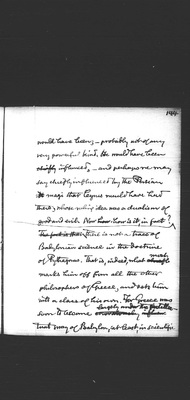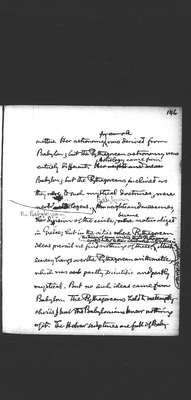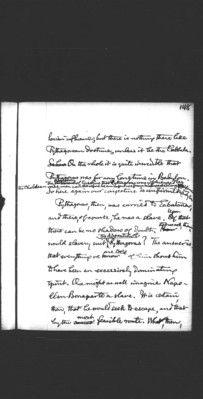Pages
81
144
would have been;— probably not of any very powerful kind. He would have been influenced,— and perhaps we may say chiefly influenced by the Persian magi that Cyrus would have had there, whose ruling idea was a dualism of good and evil. Now how is it, in fact?
There is not a trace of Babylonian science in the doctrine of Pythagoras. That is, indeed, what most marks him off from all the other philosophers of Greece, and sets him into a class of his own. For Greece was soon to become largely under the intellectual sway of Babylon, at least, in scientific
83
146
matters. Her astronomy for example was derived from Babylon; but the Pythagorean astronomy was entirely different. Astrology came from Babylon; but the Pythagoreans, inclined as they were to such mystical doctrines, were never astrologers. Babylonian weights and measures, the Babylonian division of the circle, became naturalized in Greece; but in the cities where Pythagorean ideas prevail we find nothing of these. The theory of some writers that Pythagoras contributed to their introduction into Greece is perfectly gratuitous. Much secrecy hangs over the Pythagorean arithmetic, which was partly scientific and partly mystical. But no such ideas came from Babylon. The Pythagoreans held to metempsychosis, but the Babylonians knew nothing of it. The Hebrew scriptures are full of Babylonian
85
148
influence; but there is nothing there like Pythagorean doctrine, unless it be the Cabbala. On the whole it is quite incredible that Pythagoras was for any long time in Babylon. The assertion of Eusebius that Pythagoras was influenced by the Chaldean wise men can therefore be an inference from his supposed long residence in Babylon. So here again our conjecture is confirmed.
Pythgoras, then, was carried to Ecbatana; and there, of course, he was a slave. Upon that there can be no shadow of doubt. Let us ask, then, would slavery suit the disposition of Pythagoras? The answer is that everything we are told of him shows him to have been an excessively dominating spirit. One might as well imagine Napoleon Bonaparte a slave. It is certain, then, that he would seek to escape, and that by the most feasible route. What, then,




